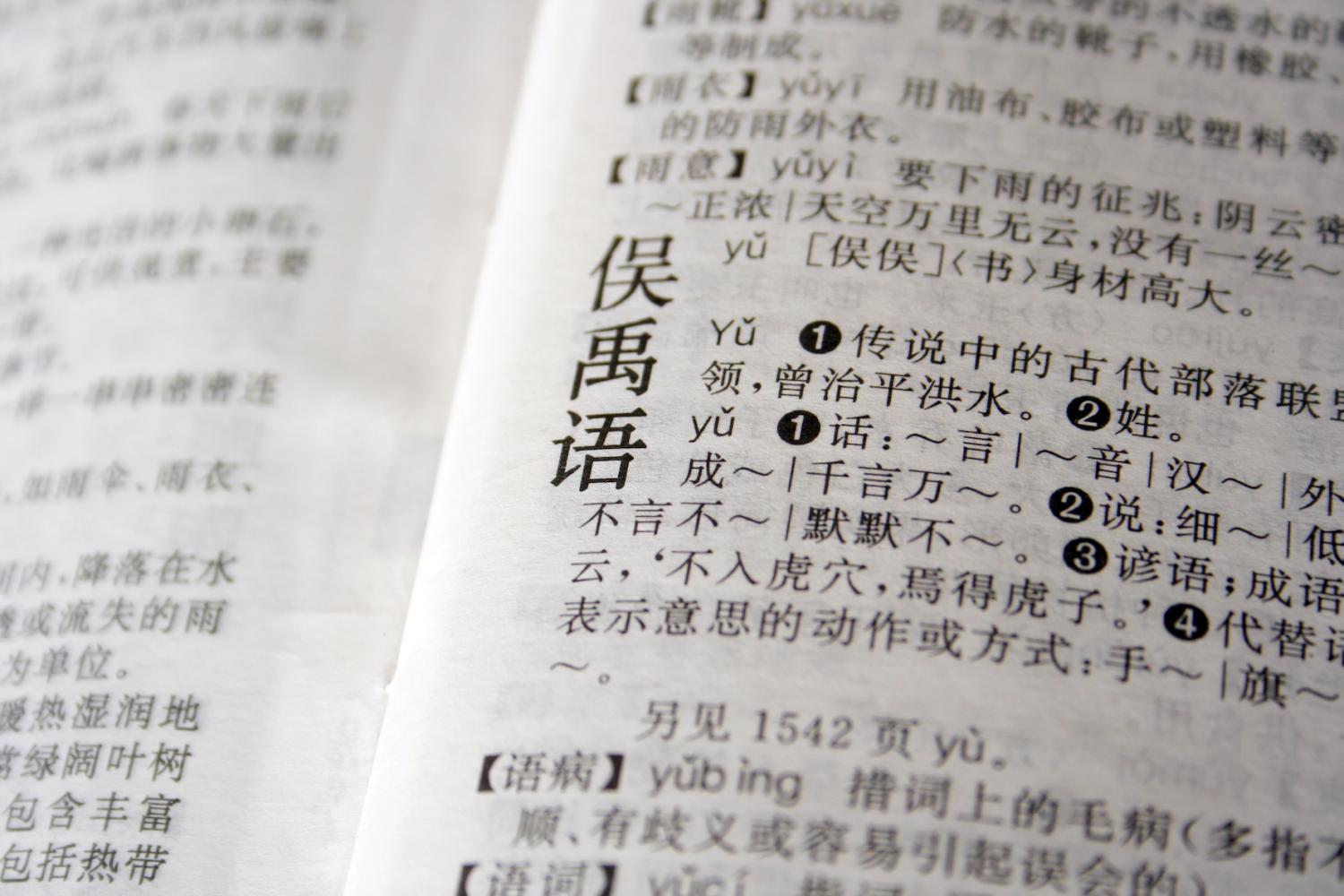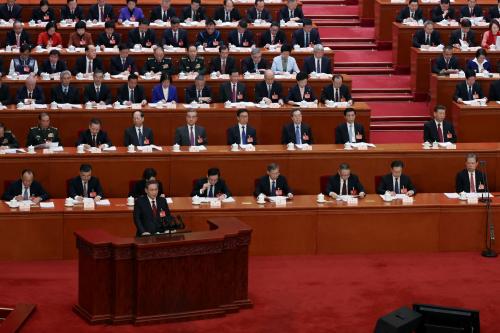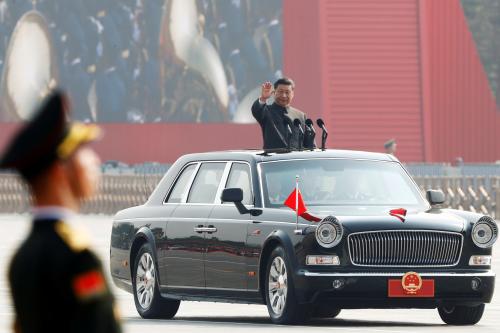This is the sixth essay of Global China’s “Lost in translation: Decoding Chinese strategic narratives” series. The full collection of essays can be found here.
In what ways did Beijing learn from the strategy, tactics, and legality of U.S. sanctions campaigns? How has China emulated U.S. unilateral sanctions practices? What does China’s domestic discourse on economic coercion tell us about its informal implementation style and its future trajectory?
China’s coercive use of economic levers has emerged as a central point of contention in its geopolitical competition with the United States. These practices of coercion are mostly unilateral, targeted, and import-oriented restrictions in the guise of domestic regulatory moves. International scrutiny of China’s coercive diplomacy has been intensifying. However, a thorough analysis of Chinese domestic discussions reflects a more complicated view than the dominant narrative of China’s increasing diplomatic assertiveness. China’s history as a target of international sanction campaigns and its observation of how the United States employs sanctions forged a unique collective belief system. It is critical to understand the perspective of a rising power that is both the target of Western sanctions and a crucial actor in the age of weaponized interdependence. Beneath the narrative of economic coercion with Chinese characteristics is China’s tendency to emulate U.S. sanctions strategies.
How Chinese strategists have historically viewed sanctions
Public discourse in China struggles to grapple with the tension between Beijing’s goal of opposing U.S. sanctions and its agenda to leverage trade dependence as a coercive tool of statecraft. China’s own experience as the recipient of U.S. sanctions during the Cold War significantly shaped its view that sanctions are “exploitative.” In Mandarin, sanction (制裁) means the punishment for law-breaking behaviors. The original connotation is largely neutral or even positive.
Many Chinese strategists embrace an understanding of unilateral sanctions through a “victim of hegemonic politics” lens. The predominant view has been that great powers often impose sanctions to advance their foreign policy agenda rather than to enforce international laws. In a similar vein, many strategists further cited the term “economic coercion” to highlight the “illegality” and “hegemonic” nature of unilateral sanctions.
For a long time, the dominant debates inside China revolved around unilateral sanctions’ legality and legitimacy. A careful examination reveals that experts diverge in their conclusions regarding whether unilateral sanctions comply with existing international laws and norms. Many scholars seek to clarify the distinction between legality and legitimacy in the use of economic sanctions. While one can assess legality based on U.N. and World Trade Organization (WTO) regulations, perceptions of a sanction campaign’s legitimacy are deeply rooted in ideological stances. Indeed, even those who recognize that international laws do not explicitly prohibit economic coercion insist that unilateral sanctions’ extraterritorial reach lacks sufficient international legitimacy. A frequently referenced example is the 1996 Helms-Burton Act, which expanded the scope of the U.S. embargo on Cuba to affect foreign companies trading with the sanctioned state. These scholars highlight that many U.S. partners, including the European Union, publicly condemned the legitimacy of the act for its “extra-territoriality.”
China’s evolution into a coercive economic actor
The frequency, scale, and instruments of China’s coercive economic statecraft have notably increased since 2010. Despite ineffective implementation, China’s imposition of export restrictions on rare earth materials in response to a territorial dispute with Japan attracted scrutiny. Former U.S. Secretary of State Hillary Clinton warned that it served as a “wake-up call” for the industrialized world about being so dependent on China. Most recently in 2022, China suspended all trade with Lithuania after a Taiwanese representative office was opened in Vilnius, which had used the word “Taiwanese” instead of “Taipei” in its name.
To date, the triggers of China’s economic coercion are mostly perceived challenges to Chinese territorial sovereignty, national and economic security, and domestic political legitimacy. It is used more reflexively than affirmatively, as a well-calculated segment of its grand strategy to advance a specific objective.
Central to China’s experimentation with sanctions is an evolving understanding of U.S. sanctions policies after World War II, including the development of targeted sanctions and the domestic legal architecture. As Evan A. Feigenbaum and Adam Szubin conclude, “It [China] has embraced unilateral economic measures with vigor, establishing its own copies of all the main weapons in the U.S. economic and financial arsenal.”
The U.S. transition from comprehensive sanctions to targeted coercion in the past two decades is one of the major lessons that many Chinese strategists emphasize. Targeted sanctions infer that the target is not the state itself but certain political elites, societal groups, or individuals within that state. Chinese legal analysts highlight how targeted coercion helps minimize the economic cost to the sanctioner itself, through such consequences as declining trade and damages to its own domestic industries. Since targeted coercion enables the sender to strategically leverage its industrial advantages, China can capitalize on its vast domestic market to pressure foreign multinational corporations into lobbying their home governments for pro-China policies. Commentators in Taiwan—a long-time target of China’s economic statecraft—capture the essence of such practice as “using business to pressure government” (以商逼政).
Against the backdrop of China’s vehement diplomatic opposition to unilateral sanctions, scholars seek to justify that Beijing is mainly against comprehensive ones. Some further distinguish China’s approach as “corrective economic coercion” (纠正型经济强制) to highlight the limited scope of its target selections and their “defensive” purpose.
Most urge the Chinese government to focus on using sanctions as a mechanism to compel specific policy changes from the target state rather than as a proactive means to pursue a broader geopolitical agenda. In brief, targeted coercion helps Chinese policymakers frame China’s coercive economic statecraft as “a legitimate means to respond to perceived interference in China’s internal affairs and sovereignty issues.” From both the tactical and legal perspective, targeted sanctions enhance China’s ability to develop policies of unilateral economic coercion.
Economic coercion with Chinese characteristics
In the early 2000s, the overarching strategy during Hu Jintao’s presidency followed Deng Xiaoping’s maxim, “hide capacities and bide time” (韬光养晦). As a result, Beijing primarily experimented with economic diplomacy to create a constructive international environment for its domestic economic needs. In contrast, coercive economic statecraft was relatively minimal in the 2000s.
Domestic scholarly discussion about sanctions has significantly increased since the 2010s (Figure 1). There has been a notable shift in focus from the legality and legitimacy of U.S. sanctions to China’s own legal framework and leverage for coercive economic statecraft.
Some key features that distinguish China’s weaponization of trade from U.S. sanctions are its informal and non-transparent implementation procedure. In all instances, the government enforced various trade disruptions without preceding announcements or explicit threats of sanctions. Many Western observers conclude that such an approach increases Beijing’s plausible deniability if it is accused of violating WTO rules and provides the government with more flexibility to de-escalate during a crisis.
However, Chinese perspectives diverge on whether the Chinese government should continue to opt for informal implementation. Some characterize this feature of intentional ambiguity as a diplomatic tactic. Others question where there is premeditated strategic intention. Instead, they attribute the feature to the Chinese cultural norm of policy ambiguity in foreign policy. In China’s domestic governance, official policy communication often involves the issuance of imprecise and general directives.
Not all strategists see policy ambiguity as a diplomatic advantage. Some strategists believe the legislative procedures of U.S. sanctions mitigate the risk of miscommunication in international disputes. During the tension with Japan over the Senkaku/Diaoyu Islands in 2012, Mei Xinyu at the Ministry of Commerce’s Institute of International Trade and Economic Cooperation urged Beijing to establish clearer policy objectives and define the scope of its maximum measures when using sanctions.
An evolving discourse characterizes Chinese laws related to sanctions as institutionally “fragmented.” Song Guoyou, an expert on China’s economic diplomacy, attributes the government’s hesitation in publicly acknowledging its use of economic coercion to the lack of sanction laws. As he points out, using executive orders and administrative correspondence to implement economic coercion is a temporary approach with limited legal validity. In brief, a growing concern is the glaring absence of a robust sanctions system that specifies decisionmaking, implementation procedures, and enforcement in China.
The future trajectory and policy implications
Since 2019, the introduction of the Provisions on the Unreliable Entity List and anti-foreign sanctions law has breathed new life into the domestic debate on sanctions. These recent developments suggest the possibility of establishing the legal basis and regulatory framework for China’s economic coercion.
One of the prominent issues is the necessity for clearer parameters for implementing sanctions. In 2014, Xi Jinping proposed the principle of “holistic national security” (总体国家安全观) which “covers all aspects of national politics, economy, military, culture, and society, and emphasizes the integration of internal and external security, along with traditional and non-traditional security.” Some strategists imply that using this extensive scope would potentially lead to too many unnecessary sanction attempts.
On the one hand, China’s experience with U.S. sanctions and its goals to build a geopolitically resilient economy led to its predominant focus on resisting sanctions. The Western-led sanctions campaign against Russia after its 2022 invasion of Ukraine has sparked greater interest in Beijing in developing a more robust sanctions-blocking system.
On the other hand, the recent development of China’s legal architecture, together with the internal discourse supporting greater institutionalization, could usher China into a new phase of more proactively employing coercive economic statecraft. However, the Group of Seven leading economies’ increasingly coordinated approach to countering China’s economic coercion may influence the PRC’s approach to implementing its coercive tactics.
As the tension between resisting U.S. sanctions and leveraging economic coercion has intensified, China’s newly passed foreign relations law signifies Beijing’s move to anchor its countermeasures within its own legal frameworks. Article 33 specifies that the State Council and its departments have the right to “take, as called for, measures to counter or take restrictive measures against acts that endanger its [the PRC’s] sovereignty, national security and development interests.” By reserving the right to interpret such “acts” that “contain or suppress China,” the government would be able to muddle the distinction between defensive countermeasures and proactive sanctions legislation.
In the past few years, the formation of an economic alliance system among like-minded countries gained traction in Washington. Some policy analysts called for “a new kind of alliance—like NATO, but for economic rather than military threats,” or a peer competition strategy of “collective resilience.” However, the feasibility of constructing such a collective response system still remains a point of contention, considering the relations between the government and private sector in the United States and most of its allies.
As more countries redefine their economic policies toward China amidst escalating U.S.-China geopolitical competition, Washington should prioritize private diplomacy to highlight the risks and uncertainties raised by China shifting toward a more proactive use of sanctions to advance its foreign policy objectives. This low-profile approach may prevent escalating tensions with China whereas an economic alliance risks pushing these two great powers further into a dangerous confrontation reminiscent of the Cold War. As U.S. allies develop their own contextualized threat assessments and policies, they will enhance their own capabilities and political resolve to counter China’s weaponization of interdependence. After all, the political will to resist comes from within.
The Brookings Institution is committed to quality, independence, and impact.
We are supported by a diverse array of funders. In line with our values and policies, each Brookings publication represents the sole views of its author(s).







Commentary
Beijing’s sanctions dilemma: Chinese narratives on economic coercion
October 21, 2024